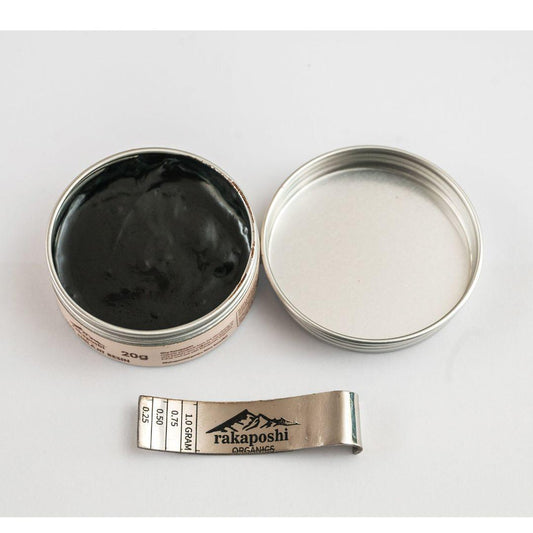
Enhancing Your Brain's Nightly Detox: How Sleep and Lifestyle Support Cognitive Health
Share
Introduction: Your Brain's Remarkable Cleaning System
The human brain is one of the most remarkable organs in the body, processing thoughts, emotions, and memories while running countless biological systems. But did you know your brain also cleans itself every night?
During deep sleep, the brain activates its glymphatic system, a natural cleaning mechanism that flushes out waste and metabolic byproducts—including proteins like beta-amyloid and tau that are associated with neurodegenerative diseases when they accumulate.
Understanding how this process works and what we can do to optimize it can lead to better cognitive health, improved sleep, and overall well-being. This article explores the science behind the brain's nighttime detox and provides evidence-based strategies to support this critical process.
The Glymphatic System: Your Brain's Cleaning Crew
Discovery and Function
Discovered in 2012 by Dr. Maiken Nedergaard and colleagues at the University of Rochester, the glymphatic system is a waste clearance system within the brain that mirrors the body's lymphatic system.
Key characteristics:
- Named for its dependence on glial cells (particularly astrocytes) and its lymphatic-like function
- Uses cerebrospinal fluid (CSF) to flush waste from brain tissue
- Most active during sleep, particularly deep sleep
- Clears metabolic waste products, including proteins that can accumulate and cause problems
How It Works
The process:
-
Cerebrospinal fluid (CSF) flows into brain tissue through spaces surrounding blood vessels (perivascular spaces)
-
CSF mixes with interstitial fluid (fluid between brain cells), picking up waste products
-
Waste-laden fluid is cleared through venous perivascular spaces and eventually drains to lymphatic vessels in the neck
-
Waste products are eliminated through the body's normal waste removal systems
What gets cleared:
- Beta-amyloid (protein associated with Alzheimer's disease)
- Tau protein (associated with various neurodegenerative diseases)
- Other metabolic waste products
- Excess neurotransmitters
- Cellular debris
The Sleep Connection
Why sleep is critical:
During deep sleep (NREM stage 3):
- Brain cells shrink by about 60%, creating more space for CSF flow
- Glymphatic clearance increases dramatically (up to 10-20x compared to waking)
- Norepinephrine levels drop, allowing vessels to dilate and CSF to flow more freely
- This is when most brain "cleaning" occurs
Research findings:
Landmark 2013 Science study (Xie et al.):
- Showed brain's interstitial space expands by ~60% during sleep
- Glymphatic clearance of beta-amyloid doubled during sleep vs. wakefulness
- Demonstrated sleep's critical role in brain waste removal
Subsequent research has shown:
- Even one night of sleep deprivation impairs waste clearance
- Chronic sleep restriction leads to accumulation of waste products
- Sleep position affects glymphatic function (side sleeping may be optimal)
- Aging reduces glymphatic efficiency
Why Deep Sleep Is Crucial for Brain Health
The Consequences of Inadequate Sleep
Short-term effects of poor sleep:
- Cognitive impairment (difficulty focusing, poor memory, reduced problem-solving)
- Mood issues (increased anxiety, irritability, emotional dysregulation)
- Reduced alertness and reaction time
- Impaired decision-making
Long-term effects of chronic sleep deprivation:
- Increased accumulation of beta-amyloid and tau proteins
- Higher risk of neurodegenerative diseases (Alzheimer's, Parkinson's)
- Accelerated cognitive decline
- Increased risk of cardiovascular disease, diabetes, obesity
- Weakened immune function
The Research Evidence
Key studies:
2013 Science study (Xie et al.):
- First demonstration of glymphatic system in living brains
- Showed dramatic increase in waste clearance during sleep
2021 study on sleep deprivation:
- Even one night without sleep significantly impairs waste clearance
- Beta-amyloid levels increase after sleep deprivation
Long-term studies:
- Poor sleep quality in midlife associated with increased Alzheimer's risk later
- Sleep disorders (sleep apnea, insomnia) linked to cognitive decline
- Adequate sleep appears protective for brain health
Modern Challenges to Deep Sleep
The Sleep Crisis
Current statistics:
- About 1 in 3 American adults don't get enough sleep (CDC)
- Average sleep duration has decreased over past decades
- Many people get less than 6 hours per night
- Sleep quality has declined due to modern lifestyle factors
Factors Disrupting Sleep
Technology and screens:
- Blue light from devices suppresses melatonin production
- Stimulating content keeps brain alert
- Late-night screen time delays sleep onset
- Reduces time in deep sleep stages
Stress and anxiety:
- Elevated cortisol interferes with sleep
- Racing thoughts prevent sleep onset
- Chronic stress reduces sleep quality
Irregular schedules:
- Inconsistent sleep/wake times disrupt circadian rhythm
- Shift work particularly problematic
- Social jet lag (different schedules on weekends vs. weekdays)
Environmental factors:
- Light pollution
- Noise
- Temperature (too warm or too cold)
- Uncomfortable sleep environment
Lifestyle factors:
- Caffeine consumption (especially late in day)
- Alcohol (disrupts sleep architecture despite sedating effects)
- Lack of physical activity
- Late meals
Evidence-Based Strategies to Optimize Glymphatic Function
1. Prioritize Quality Sleep
Sleep duration:
- Adults: 7-9 hours per night
- Older adults: 7-8 hours (needs don't decrease as much as commonly thought)
- Quality matters as much as quantity
Sleep hygiene practices:
Consistent schedule:
- Go to bed and wake at same time daily (even weekends)
- Helps regulate circadian rhythm
- Improves sleep quality over time
Optimize sleep environment:
- Dark: Blackout curtains, remove light sources, eye mask if needed
- Cool: 65-68°F (18-20°C) is optimal for most people
- Quiet: White noise machine, earplugs if needed
- Comfortable: Quality mattress and pillows
Pre-sleep routine:
- Wind down 1-2 hours before bed
- Dim lights in evening
- Avoid screens (or use blue light filters)
- Relaxing activities (reading, gentle stretching, meditation)
Avoid sleep disruptors:
- Caffeine: Avoid after 2 PM (half-life is 5-6 hours)
- Alcohol: Avoid close to bedtime (disrupts sleep architecture)
- Large meals: Finish eating 2-3 hours before bed
- Intense exercise: Complete vigorous workouts earlier in day
2. Align with Your Circadian Rhythm
Why it matters:
- Your body has natural sleep-wake cycles
- Deep sleep occurs more in first half of night
- Aligning with natural rhythms improves sleep quality
Practical strategies:
Morning light exposure:
- Get 10-30 minutes of outdoor light within 1-2 hours of waking
- Helps set circadian clock
- Improves nighttime sleep quality
Consistent schedule:
- Ideal bedtime for most people: 10 PM - 11 PM
- Allows maximum deep sleep in early night hours
- Adjust based on your natural chronotype (early bird vs. night owl)
Avoid late-night activities:
- Stimulating activities delay sleep onset
- Bright lights suppress melatonin
- Keep evenings calm and dim
3. Sleep Position Matters
Research findings:
- Side sleeping (lateral position) may enhance glymphatic clearance compared to back or stomach sleeping
- One study found side sleeping most efficient for waste removal
- May reduce sympathetic nervous system activity
Practical application:
- If comfortable, try sleeping on your side
- Use pillows to support comfortable side-sleeping position
- Don't force it if uncomfortable—sleep quality matters most
4. Stay Hydrated
Why hydration matters:
- Cerebrospinal fluid is mostly water
- Dehydration can reduce CSF production and flow
- Adequate hydration supports glymphatic function
Practical strategies:
- Drink water throughout the day
- Aim for half your body weight in ounces daily
- Small glass of water before bed (but not so much you wake to urinate)
- Monitor urine color (pale yellow indicates good hydration)
5. Regular Exercise
Why exercise helps:
- Improves sleep quality and duration
- Increases time in deep sleep
- Enhances blood flow and arterial pulsations (helps drive CSF flow)
- Reduces stress and anxiety
Research shows:
- Regular exercise improves sleep quality
- Moderate aerobic exercise increases deep sleep
- Timing matters (avoid vigorous exercise close to bedtime)
Practical recommendations:
- Aim for: 150+ minutes moderate aerobic activity weekly
- Include: Strength training 2-3x per week
- Timing: Complete vigorous exercise at least 3-4 hours before bed
- Gentle evening options: Yoga, stretching, walking
6. Stress Management and Relaxation
Why stress affects sleep:
- Elevated cortisol interferes with sleep onset and quality
- Anxiety and rumination prevent deep sleep
- Chronic stress reduces glymphatic efficiency
Evidence-based stress management:
Meditation and mindfulness:
- Reduces stress and anxiety
- Improves sleep quality
- Lowers norepinephrine (which inhibits glymphatic function when elevated)
- Even 10-15 minutes daily helps
Deep breathing:
- Activates parasympathetic nervous system (relaxation response)
- May enhance CSF flow through respiratory pump mechanism
- Calms mind before sleep
Progressive muscle relaxation:
- Systematically tense and relax muscle groups
- Reduces physical tension
- Promotes relaxation and sleep
Journaling:
- Process thoughts and worries before bed
- Reduces nighttime rumination
- Gratitude journaling improves sleep quality
7. Address Sleep Disorders
Common sleep disorders that impair glymphatic function:
Sleep apnea:
- Disrupts sleep architecture
- Reduces deep sleep
- Impairs glymphatic clearance
- Associated with increased Alzheimer's risk
- Treatment: CPAP, oral appliances, weight loss, positional therapy
Insomnia:
- Difficulty falling or staying asleep
- Reduces total sleep and deep sleep
- Treatment: Cognitive behavioral therapy for insomnia (CBT-I), sleep hygiene, sometimes medication
Restless leg syndrome:
- Disrupts sleep onset and quality
- Treatment: Iron supplementation if deficient, medications, lifestyle changes
If you suspect a sleep disorder, see a healthcare provider or sleep specialist for proper evaluation and treatment.
Nutrition and Brain Health
Foods That Support Sleep and Brain Health
Sleep-promoting nutrients:
Magnesium:
- Supports sleep quality
- Relaxes muscles and nervous system
- Sources: Dark leafy greens, nuts, seeds, whole grains
Tryptophan:
- Precursor to serotonin and melatonin
- Sources: Turkey, chicken, eggs, dairy, nuts, seeds
Melatonin:
- Naturally present in some foods
- Sources: Tart cherries, tomatoes, walnuts
Complex carbohydrates:
- Support tryptophan uptake to brain
- Sources: Whole grains, sweet potatoes, oats
Brain-supporting nutrients:
Omega-3 fatty acids:
- Support brain structure and function
- Anti-inflammatory
- Sources: Fatty fish, walnuts, flaxseeds
Antioxidants:
- Protect brain from oxidative stress
- Sources: Berries, dark chocolate, colorful vegetables
B vitamins:
- Support brain metabolism
- Sources: Whole grains, leafy greens, eggs, meat
Dietary Patterns for Brain Health
Mediterranean diet:
- Most researched diet for brain health
- Associated with reduced cognitive decline
- Emphasizes vegetables, fruits, whole grains, fish, olive oil
MIND diet:
- Specifically designed for brain health
- Combination of Mediterranean and DASH diets
- Research shows reduced Alzheimer's risk
Traditional Approaches and Brain Health
Shilajit and Sleep/Brain Health Claims
Shilajit is sometimes marketed for sleep, brain detoxification, and cognitive support.
What marketing claims:
- "Supports sleep quality and brain detox"
- "Enhances glymphatic function"
- "Reduces stress and promotes relaxation for better sleep"
- "Supports cellular repair and brain health"
- "Combats oxidative stress, preserving neuron health"
- "Boosts energy and mental clarity by improving mitochondrial function"
- "Detoxifies harmful substances, reducing burden on glymphatic system"
- "Aids in flushing heavy metals and toxins"
What research actually shows:
- NO studies on shilajit and glymphatic function
- NO studies on shilajit and sleep quality
- NO studies on shilajit and brain detoxification
- NO studies on shilajit and cognitive function in healthy individuals
- Very limited research overall (covered in previous blogs)
The reality:
- Shilajit is NOT proven to enhance sleep
- It is NOT proven to support glymphatic function
- It is NOT proven to "detoxify" the brain or body
- It is NOT proven to improve cognitive function
- It is NOT proven to reduce oxidative stress in humans
- Claims far exceed evidence
What actually supports glymphatic function:
- Quality sleep (7-9 hours)
- Sleep hygiene practices
- Regular exercise
- Hydration
- Stress management
- Healthy diet
- Treatment of sleep disorders
Lifestyle Practices Summary
Daily Habits for Optimal Brain Detox
Morning: ✅ Consistent wake time ✅ Outdoor light exposure (10-30 min) ✅ Hydration ✅ Nutritious breakfast ✅ Movement/exercise
Throughout Day: ✅ Stay hydrated ✅ Regular physical activity ✅ Balanced, brain-healthy meals ✅ Stress management ✅ Limit caffeine after 2 PM
Evening: ✅ Wind down routine (1-2 hours before bed) ✅ Dim lights ✅ Avoid screens ✅ Relaxation practices (meditation, reading, gentle stretching) ✅ Cool, dark, quiet sleep environment ✅ Consistent bedtime
Weekly: ✅ 150+ min aerobic exercise ✅ 2-3x strength training ✅ Stress management practices ✅ Social connection ✅ Time in nature
When to Seek Medical Help
See a healthcare provider if you have:
- Persistent difficulty falling or staying asleep (insomnia)
- Loud snoring, gasping, or breathing pauses during sleep (possible sleep apnea)
- Excessive daytime sleepiness despite adequate sleep time
- Restless legs or uncomfortable sensations preventing sleep
- Cognitive concerns (memory problems, confusion, difficulty concentrating)
- Mood changes (depression, anxiety) affecting sleep or daily function
Don't delay seeking help. Sleep disorders and cognitive issues require proper medical evaluation and evidence-based treatment.
The Bottom Line
Your brain works hard every night to clean out waste, repair cells, and consolidate memories. The glymphatic system is a remarkable cleaning mechanism that depends on quality sleep to function optimally.
What actually supports brain detoxification:
- Quality sleep (7-9 hours nightly, prioritizing deep sleep)
- Consistent sleep schedule (align with circadian rhythm)
- Sleep hygiene (dark, cool, quiet environment; pre-sleep routine)
- Regular exercise (improves sleep and brain health)
- Hydration (supports CSF production and flow)
- Stress management (meditation, relaxation practices)
- Healthy diet (Mediterranean or MIND diet pattern)
- Treatment of sleep disorders (if present)
What doesn't work (or lacks evidence):
- Supplements marketed for "brain detox" (including shilajit)
- "Detox" products or protocols
- Quick fixes or shortcuts
Small changes to your daily habits can make a big difference in how you think, feel, and function. Prioritize sleep, manage stress, stay active, and give your brain the support it needs through evidence-based practices.
A healthy brain is the foundation of overall well-being—and it starts with quality sleep.
References:
Xie, L., et al. (2013). "Sleep Drives Metabolite Clearance from the Adult Brain." Science, 342(6156), 373-377.
Iliff, J. J., et al. (2012). "A Paravascular Pathway Facilitates CSF Flow Through the Brain Parenchyma and the Clearance of Interstitial Solutes, Including Amyloid β." Science Translational Medicine, 4(147).
Nedergaard, M., & Goldman, S. A. (2020). "Glymphatic failure as a final common pathway to dementia." Science, 370(6512), 50-56.
Lee, H., et al. (2015). "The Effect of Body Posture on Brain Glymphatic Transport." Journal of Neuroscience, 35(31), 11034-11044.
Shokri-Kojori, E., et al. (2018). "β-Amyloid accumulation in the human brain after one night of sleep deprivation." Proceedings of the National Academy of Sciences, 115(17), 4483-4488.
Discover authentic Rakaposhi Gold Shilajit—sourced from the Karakoram mountains of Gilgit-Baltistan, processed using traditional Aftabi sun-drying methods, independently lab-tested for purity and safety. If you choose to incorporate traditional Ayurvedic approaches into your wellness routine, do so with realistic expectations based on very limited research—not as a sleep aid, brain detoxifier, or replacement for proper sleep hygiene, stress management, exercise, hydration, and medical care when needed. Quality sleep is the foundation of brain health.



